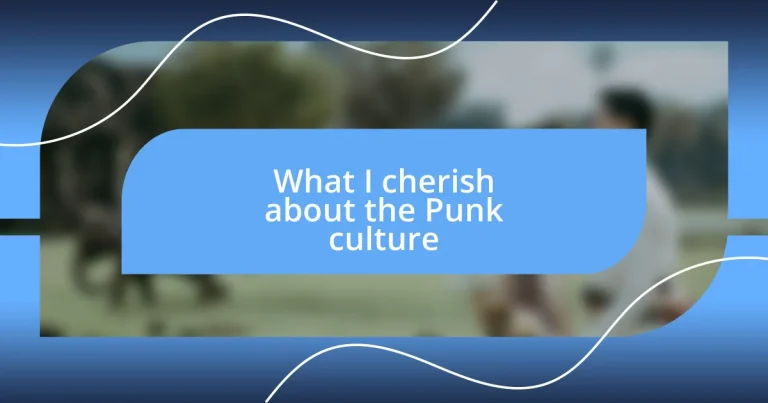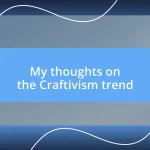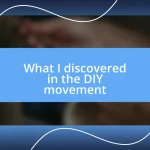Key takeaways:
- Punk culture emphasizes rebellion and self-expression, rooted in a DIY ethos that fosters authenticity and individualism.
- The historical context of punk emerged from socio-political upheaval in the 1970s, influencing music, art, fashion, and community identity.
- Punk serves as a powerful vehicle for activism, encouraging collective action and social change while promoting inclusiveness and solidarity among its members.
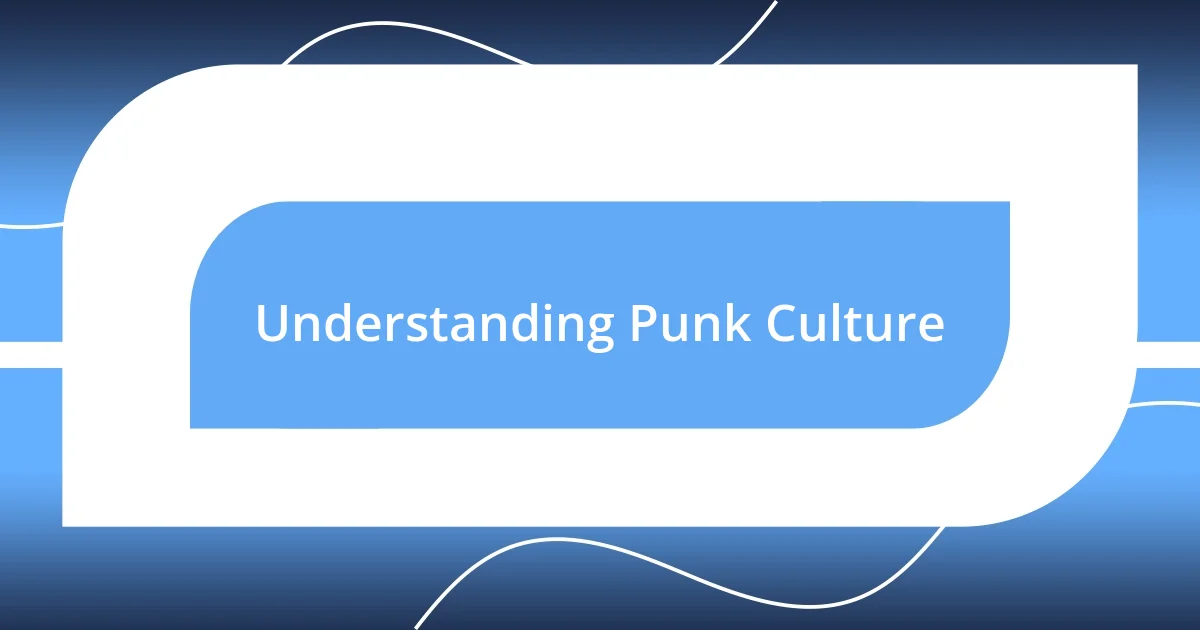
Understanding Punk Culture
Punk culture, at its core, is about rebellion and self-expression. I remember my first punk show; the raw energy of the crowd was electric. There’s something so powerful about being part of a community that rejects conformity and celebrates individuality – it’s like a fierce reminder that it’s okay to be different.
One of the most fascinating aspects of punk culture is its DIY ethos. When I think about my experiences creating zines and attending local gigs, I realize these activities aren’t just hobbies; they’re tangible acts of defiance against mainstream culture. Have you ever felt the thrill of crafting something truly your own? It’s liberating, and it encapsulates the very spirit of punk.
Punk also isn’t just a musical genre; it’s a way of thinking and living. I often ponder how the vivid colors of album covers and the chaotic aesthetics reflect deeper emotions and social issues. It challenges us to question authority and take a stand. Isn’t it intriguing how a simple chord progression can evoke such a profound sense of community and purpose?
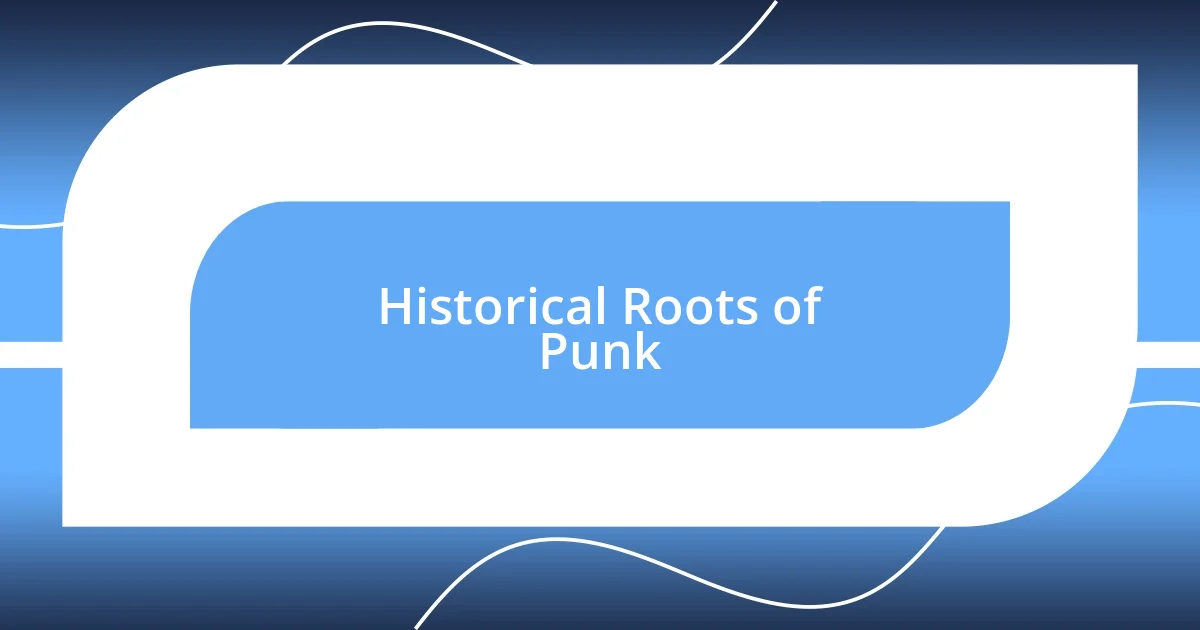
Historical Roots of Punk
Punk culture has deep roots that trace back to the socio-political upheaval of the 1970s. It emerged primarily in the United States and the United Kingdom, fueled by a generation disillusioned with mainstream society. I’ve often found myself reflecting on how music, art, and fashion collided at this intersection, giving birth to a movement that was as much about attitude as it was about sound.
Key influences on punk culture include:
- The Vietnam War and its impact on American youth disillusionment.
- Economic struggles and unemployment in the UK, especially during the late 1970s.
- Garage rock and proto-punk bands like The Stooges and The Velvet Underground, whose raw sounds paved the way.
- The influential Sex Pistols and bands like The Clash, who brought punk to the forefront, galvanizing a generation.
- The DIY aesthetic born out of necessity, where bands created their own music and scenes without corporate backing.
It’s fascinating to me how these cultural triggers not only shaped the music but also inspired a fierce sense of identity and community among punks. There’s something almost poetic about that raw spirit of rebellion coming together, creating a legacy that still resonates today.
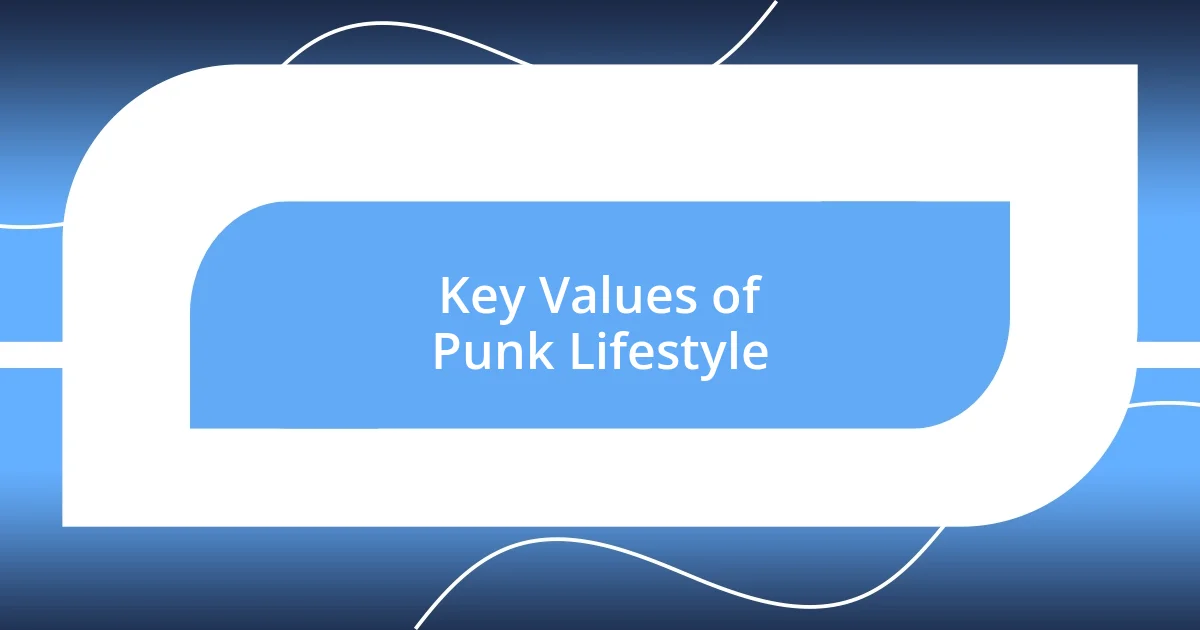
Key Values of Punk Lifestyle
The key values of punk lifestyle resonate deeply with those who embrace the culture. At its heart is a commitment to authenticity. Reflecting on my past, I recall a vibrant conversation with a stranger at a punk festival who passionately shared their journey of self-discovery through this counterculture. Their story reminded me that living genuinely, regardless of societal expectations, is a fundamental tenet of punk. It’s this authenticity that beckons many to abandon pretenses and celebrate who they truly are.
Another cornerstone of punk is its emphasis on individualism. I’ve seen this value manifest in countless ways, from the eclectic fashion choices that dare to break the mold to the unapologetic attitudes displayed in conversations. One time, while browsing my local thrift store, I encountered a jacket adorned with patches that told a story of rebellion and resistance. That moment made me realize how each person’s unique expression contributes to a collective identity, yet retains its individuality. Isn’t it powerful how personal statements are woven into the fabric of a community?
Moreover, the punk culture embodies a strong sense of community built on mutual respect and support. I remember attending a small underground show where everyone, from the band members to audience members, shared an unspoken bond. We all cheered each other on, embodying the idea that punk is as much about connecting with others as it is about standing apart. This spirit isn’t just about noise; it’s about celebrating our differences while finding solidarity in our shared values. It reshapes our understanding of what it means to belong.
| Key Value | Description |
|---|---|
| Authenticity | Living true to oneself without succumbing to societal pressures. |
| Individualism | Embracing one’s unique identity and personal expression. |
| Community | Fostering a supportive network that celebrates shared values and differences. |
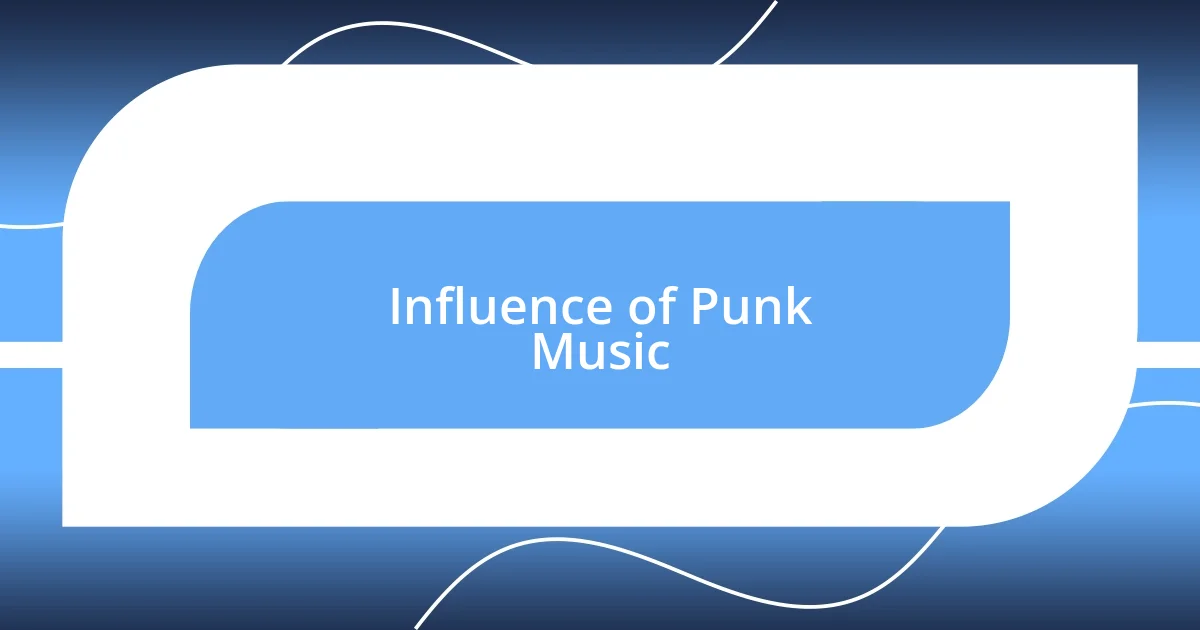
Influence of Punk Music
Punk music has always been a powerful force for social commentary. I recall listening to “Anarchy in the U.K.” by the Sex Pistols and feeling the pulse of rebellion through every note. It struck me how these lyrics didn’t just resonate with frustration; they screamed for change, sparking conversations even in my circle about political activism. Isn’t it incredible how a simple song can ignite a fire of awareness and engagement among listeners?
Moreover, the DIY ethos in punk music shaped my understanding of creativity. Bands like Minor Threat and their homemade recordings meant that anyone with a passion could express themselves, no matter their resources. I remember attending a local show where a fresh band played their own songs, each more raw and honest than the last. It felt like a celebration of artistic freedom—an environment where anyone could step up to the mic. How empowering is it to know that punk encourages everyone to share their voice, even if it’s unrefined?
Finally, the sense of camaraderie fostered by punk music has had a lasting impact on the way I connect with others. When I first got into punk, I felt like I was part of a family, bound by the understanding of our shared struggles. I often think back to a time when strangers at a small gig sang together, their voices blending into a choir of hope and defiance. Those moments remind me that punk isn’t just tunes and riffs; it’s a collective heartbeat, a reminder that we’re all in this together, longing for change and solidarity.
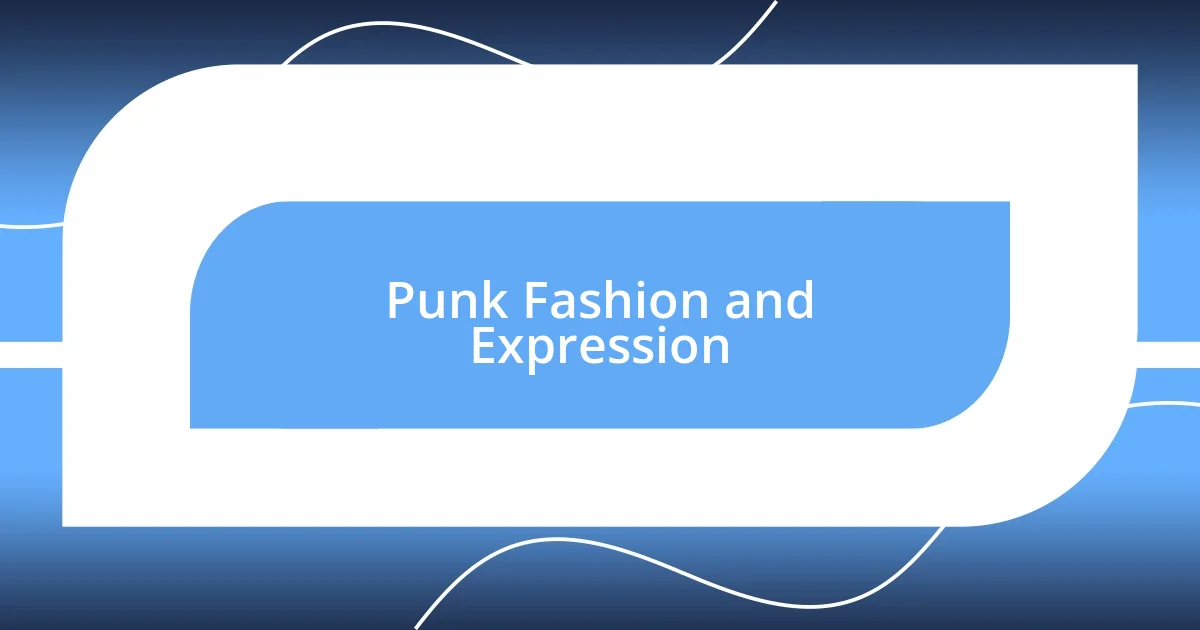
Punk Fashion and Expression
Punk fashion is a vibrant expression of individuality and rebellion. I still remember the first time I walked into a punk show, and the room exploded with colorful hair, leather jackets, and DIY accessories. Each outfit told a story, sparking my curiosity—what motivated each person’s choice? I learned quickly that every ripped tee, studded belt, and spiked bracelet was a badge of honor, reflecting not just style but a fierce attitude against conformity. This eclectic mix speaks volumes about the desire to stand out in a sea of uniformity.
I’ve often found myself fascinated by the transformative power of punk fashion. Once, I decided to create my own custom vest covered in patches from my favorite bands and political movements. It was exhilarating to dive into that creative process, sewing and arranging until I had a piece that felt entirely me. I can’t help but think—how many others have experienced a similar journey of self-creation? Punk encourages this exploration, allowing us to redefine ourselves and share our stories through what we wear.
The raw authenticity of punk style captures a spirit of defiance that resonates deeply with me. I vividly recall a conversation with a friend who wore a mohawk with pride, sharing how it had become not just a hairstyle but a symbol of her refusal to conform to societal expectations. I found myself pondering: isn’t it inspiring how fashion choices can spark conversations and challenge norms? Each bold statement piece, whether it’s vibrant hair or a pair of combat boots, becomes a form of protest—an invigorating reminder that what we wear is more than fabric; it’s our voice in visual form.
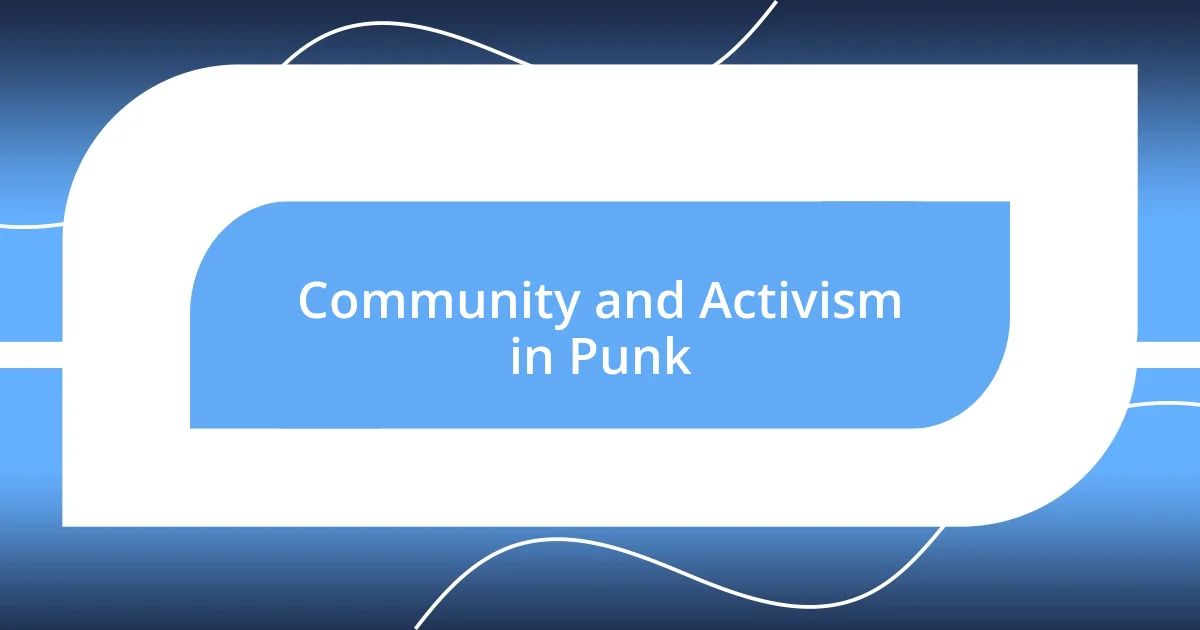
Community and Activism in Punk
The punk community has often been a breeding ground for activism, fostering strong ties among individuals who share a vision for change. I remember attending a benefit concert organized by local punks for a homeless shelter in our city. The energy in that dingy basement venue was palpable. Not only were we there to rock out, but we were also united in a shared purpose—an embodiment of the belief that music can create tangible social impact. It made me realize just how powerful our collective action can be, demonstrating that unity is a cornerstone of punk culture.
Activism within punk isn’t limited to grand gestures; it often takes the form of everyday actions that show support for marginalized communities. I distinctly recall sitting in a circle with friends discussing our favorite bands that advocated for LGBTQ+ rights, and it was inspiring to see how music becomes a vehicle for awareness. It wasn’t just about the ethereal notes or catchy hooks; it was about the message of inclusiveness that transcended traditional boundaries. How often do we consider the implications of our favorite songs beyond the dance floor? For me, those moments deepen my appreciation for how punk culture has historically championed voices that often go unheard.
What truly excites me about the punk community is its resilience against oppression and injustice. I once joined a grassroots movement advocating for environmental sustainability led by members of the local punk scene. The passion was infectious, and I found myself designing flyers for our clean-up events and rallies. Engaging with people who shared similar values fueled my desire to contribute and to fight against things that matter, igniting a sense of purpose. Isn’t it remarkable how punk’s spirit of rebellion naturally translates into activism, making it easy for us to channel our frustrations into meaningful action? That’s what I cherish—knowing that punk isn’t just about rebellion; it’s also about building a better world together.
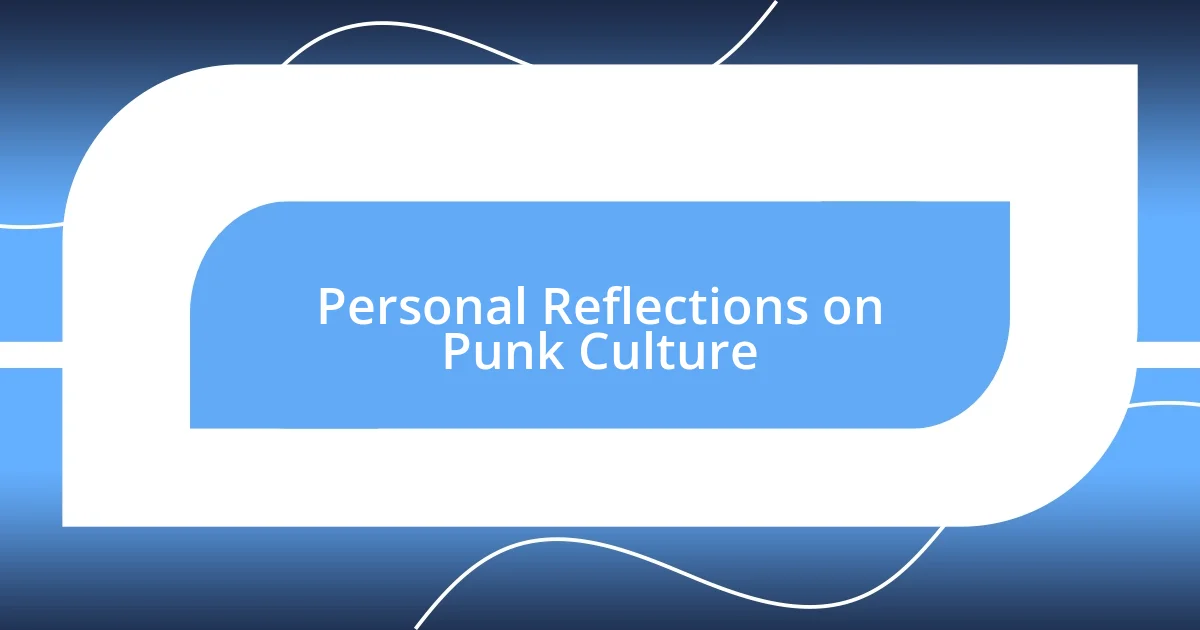
Personal Reflections on Punk Culture
Reflecting on punk culture, I can’t help but think about the pivotal moments when I truly felt its impact on my life. It was during a small, underground gig where I first connected with the raw energy of the scene. Standing shoulder to shoulder with fellow fans, I felt an unspoken bond form through the loud guitar riffs and passionate lyrics. It made me realize that this culture wasn’t just about music; it was about building friendships and a sense of belonging in a world where we often feel isolated.
I’ve always been drawn to the fearless nature of punk, which dares us to confront uncomfortable truths. There was one time when my friends and I joined a protest against corporate greed, and I can still recall the thrill of holding up our handmade signs. Amidst the chants and cheers, I felt like we were part of something much bigger than ourselves. It was empowering to see how the punk ethos of standing up for what matters can inspire collective courage. Have you ever been in a moment like that, where you felt the weight of shared purpose? It’s honestly surreal.
What continues to resonate with me is the idea that punk culture embraces all forms of expression, whether that’s through music, art, or activism. I fondly remember a day spent in a local art space, surrounded by vibrant, rebellious artwork created by fellow punks. Each piece told a story filled with defiance and hope. It prompted me to reflect—how often do we stop to appreciate the creative voices that challenge our perspectives? I think it’s vital to recognize that punk doesn’t just reject the status quo; it celebrates imagination as a tool for change and connection.












